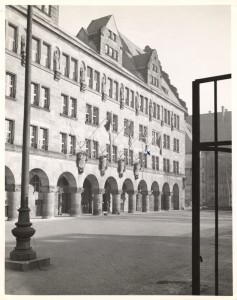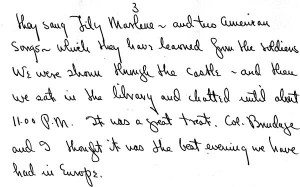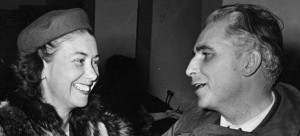The growing staff of the International Military Tribunal was preparing to prosecute individuals held responsible for some of the most horrific, gruesome, and bloodcurdling actions during WWII. The environment of the court was becoming increasingly intense and professional with the lives of many on trial for those actions. Many of the military men, as well as those investigating and working for the prosecution teams, took the time to create or balance the daily exposure to chilling facts of the Nazi regime with more pleasant activities during their time in Germany.
Dinner parties, traveling, or attending performances at the opera house became regular occurrences as the staff settled in and became better acquainted with one another. On 15 September 1945, Colonel Amen held a cocktail party for himself and ten others including Jackson, the man who selected Dodd for the U.S. team. The event included a private dinner party at the hotel. Dodd informed his wife, “It is quite informal and it does make life in this atmosphere at least bearable” [p. 129, 9/15/45]. Four days later on the 19th of September, Colonel Corley hosted a dinner party of his own at the Herr von Faber Castle, which was designed with a marvelous 80 rooms, and contained a prominent orchestra welcoming the guests as they entered the majestic Castle.
Later in the evening, a group of German singers came and sang songs including American classics such as “Lily Marlene,” and Dodd remarked it as the ” best evening we have had in Europe” [p. 133, 9/19/45]. This was soon followed by planning for a trip to Italy. Colonels Corley and Brundage, with Dodd, mapped out a four to five day expedition across Italy visiting Naples, Capri, Naples again, then on to Rome and Florence before returning to Nürnberg. Definitely a once in a life time opportunity to travel and see some of the most gorgeous and historic cities in all of Europe, emerging from the dark days of war.
The true beauty of Germany was on display the day after Colonel Amen’s cocktail party, and experienced while attending services at St. Anthony’s. A “moving spectacle—the first confirmation in Nürnberg for more than eight years… The children looked good and the little girls were all in white clothing! These Germans are amazing people. Where they get the soap to wash with is beyond me yet the little white dresses were white and clean… Indeed it affected us to see them. The most pitiful signs were behind—blind children with missing limbs—the awful results of the war and the air raids” [p. 129, 9/15/45]. In contrast,
Dodd also wrote about the German interest in flowers and their beauty in which he wrote, “they love flowers, for example. In all of this reck and ruin, we see flowers flowers in window boxes, flowers being sold, flowers being carried, flowers being worn” [p. 137, 9/20/45] The natives of Nürnberg were grieving but also striving to rebuild, not only their homes but their lives.
All was not peaceful and calm, however. Dodd documented that the Russian troops were taking revenge on Germany by looting homes, raping women, and transporting people for labor. Dodd noted,”…Poles—the soldiers and officers who fought for Poland against Germans and Russians when both invaded the country—are to be shipped back to Poland, which means to Russia and death and worse” [p. 136, 9/20/45]. The Russians were taking advantage of the Polish and practically slaughtering them for no reason. Dodd describes Russians as,”… Beasts and worse… The sight of them raises my blood pressure” [p. 129, 9/15/45]. Finally Russians were devastating German towns in a 3 step process.
Week one, Russians would move in and steal any useful machinery and tools. Week two, they would barge into households and take any valuable goods and furnishings. Then finally in the third week, all men ages 16-40 were stripped from their homes and lives to be shipped to Russia. Dodd notes,” Rape and violence are the order of the day” [p. 130, 9/15/45]. Russians were acting exactly as those who were being prosecuted, and with no restraints. It is to be expected that the actions of the Russians that Dodd observed and documented had a great impact him in his subsequent career in the U.S. Senate. In the face of tragedy many, Dodd included, moved through the good and bad to be found at Nürnberg, with the thought, “If I can contribute anything to this program, which even in the smallest way will make the waging of war less likely, then our separation is indeed worthwhile” [p.130, 9/20/45]. This quote is inspirational, even today, and reflects the feelings of many, who like Dodd, loved and missed his “dearest Grace,” and the family he left behind in service to his country.
–Owen Doremus and Betsy Pittman
[Owen Doremus, a junior at Edwin O. Smith High School, is supporting this blog series with research and writing as part of an independent study.]
The majority of the letters from Tom Dodd to his wife Grace have been published and can be found in Letters from Nuremberg, My father’s narrative of a quest for justice. Senator Christopher J. Dodd with Lary Bloom. New York: Crown Publishing, 2007.
Images available in Dodd Papers:




